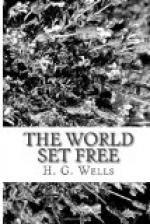For thousands of years this gathering impulse to creative work must have struggled in man against the limitations imposed upon him by his social ineptitude. It was a long smouldering fire that flamed out at last in all these things. The evidence of a pathetic, perpetually thwarted urgency to make something, is one of the most touching aspects of the relics and records of our immediate ancestors. There exists still in the death area about the London bombs, a region of deserted small homes that furnish the most illuminating comment on the old state of affairs. These homes are entirely horrible, uniform, square, squat, hideously proportioned, uncomfortable, dingy, and in some respects quite filthy, only people in complete despair of anything better could have lived in them, but to each is attached a ridiculous little rectangle of land called ‘the garden,’ containing usually a prop for drying clothes and a loathsome box of offal, the dustbin, full of egg-shells, cinders, and such-like refuse. Now that one may go about this region in comparitive security—for the London radiations have dwindled to inconsiderable proportions—it is possible to trace in nearly every one of these gardens some effort to make. Here it is a poor little plank summer-house, here it is a ‘fountain’ of bricks and oyster-shells, here a ‘rockery,’ here a ‘workshop.’ And in the houses everywhere there are pitiful little decorations, clumsy models, feeble drawings. These efforts are almost incredibly inept, like the drawings of blindfolded men, they are only one shade less harrowing to a sympathetic observer than the scratchings one finds upon the walls of the old prisons, but there they are, witnessing to the poor buried instincts that struggled up towards the light. That god of joyous expression our poor fathers ignorantly sought, our freedom has declared to us....
In the old days the common ambition of every simple soul was to possess a little property, a patch of land, a house uncontrolled by others, an ‘independence’ as the English used to put it. And what made this desire for freedom and prosperity so strong, was very evidently the dream of self-expression, of doing something with it, of playing with it, of making a personal delightfulness, a distinctiveness. Property was never more than a means to an end, nor avarice more than a perversion. Men owned in order to do freely.




